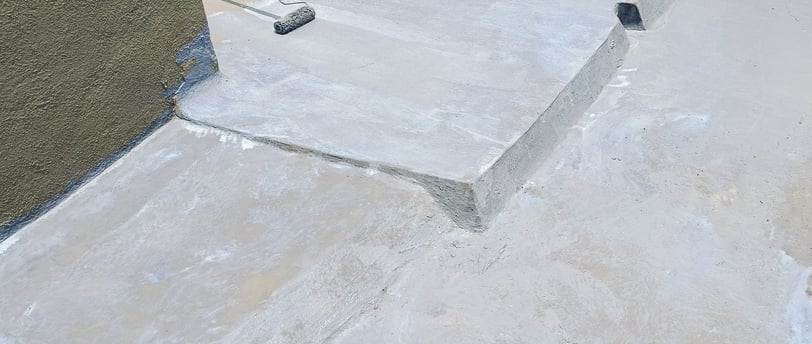1. Liquid Waterproofing Membrane
Liquid waterproofing is applied as a coating or membrane. It is typically a liquid that is spread on the surface and forms a flexible, seamless membrane as it dries.


A Liquid Waterproofing Membrane (LWM) is a flexible, seamless, and durable waterproofing solution applied in a liquid form that cures to form a continuous protective membrane. It is commonly used for a wide range of waterproofing applications, including roofs, balconies, basements, terraces, and wet areas in buildings.
Here’s an in-depth look at Liquid Waterproofing Membranes:
Characteristics of Liquid Waterproofing Membrane
Seamless Application:
The liquid is applied in a way that it covers the surface without seams or joints, ensuring complete waterproofing. This eliminates the risk of water penetration through gaps or seams, which is common with sheet membranes.
Flexibility:
Once cured, LWM remains flexible, making it ideal for areas that experience movement due to temperature changes, settling, or structural shifting. This flexibility helps the membrane stretch without cracking or breaking.
Easy Application:
LWM is typically applied using a roller, brush, or spray, making it easy to cover irregular surfaces such as corners, edges, and joints. It doesn’t require specialized equipment like sheet membranes do.
Durability:
The membrane is resistant to various external factors, such as UV radiation, water, and weathering, which contributes to its long-term effectiveness in both exposed and non-exposed applications.
Cost-Effective:
Liquid membranes are generally more affordable in terms of material cost and labor when compared to other waterproofing methods, especially in complex or hard-to-reach areas.
Environmentally Friendly:
Many liquid waterproofing products are made from environmentally safe, water-based solutions with low VOCs (volatile organic compounds), making them safer for both the applicator and the environment.
Applications of Liquid Waterproofing Membranes
Roofs:
Commonly used on flat and sloped roofs, liquid membranes create a waterproof barrier that is ideal for protecting against leaks and water damage. They also offer UV resistance, which helps in prolonging the lifespan of the roof.
Basements:
Applied on external and internal basement walls, liquid membranes offer excellent waterproofing to prevent water ingress due to hydrostatic pressure.
Terraces and Balconies:
These areas are prone to water exposure. Liquid waterproofing helps prevent water penetration, thereby protecting the structure from damage caused by rainwater.
Wet Areas:
Bathrooms, kitchens, and laundry areas benefit from LWM as they provide a reliable waterproofing solution for floors and walls, preventing mold, mildew, and water damage.
Underground Structures:
Liquid membranes can be applied to foundations and other subterranean areas to prevent seepage and moisture-related issues.
Water Tanks:
Liquid membranes are also used in the waterproofing of water storage tanks to ensure that water stays contained and doesn't leak.
Types of Liquid Waterproofing Membranes
Liquid membranes come in different formulations, which are based on their specific application and the environment they are meant to withstand. Common types include:
Acrylic-based Liquid Membranes:
These are the most widely used liquid membranes due to their excellent bonding properties and flexibility. They are UV resistant and provide great waterproofing for roofs, balconies, and facades.
Bituminous-based Liquid Membranes:
Bitumen is a petroleum-based material known for its water-resistant qualities. When applied as a liquid, it offers a durable and robust waterproof barrier, particularly on roofs and foundations.
Polyurethane-based Liquid Membranes:
Known for their superior flexibility and elasticity, these membranes are commonly used on roofs and other exposed surfaces. They provide exceptional protection against water infiltration, UV degradation, and physical wear.
Rubber-based Liquid Membranes:
Similar to polyurethane membranes, rubber-based membranes offer excellent flexibility, making them suitable for areas that experience frequent movement, such as expansion joints or foundations.
